Good Omens Set Secrets: Behind the Scenes of a Fairy Tale Fantasy and TV’s “Loveliest Couple”
Take a walk with us through the magical sets of Aziraphale’s bookshop, The Dirty Donkey pub, Nina’s coffee shop, and hear how the designers did it.
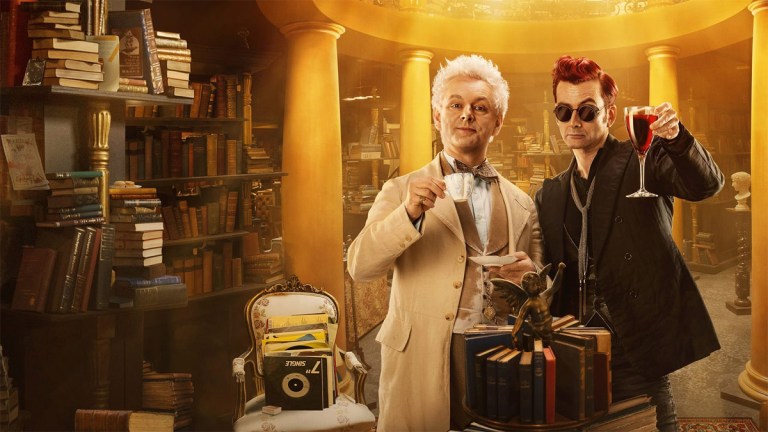
Warning: contains minor spoilers for Good Omens Season 2
The set for season two of Good Omens is a complete entity – you can walk up and down Whickber Street, browse the record shop, the magic shop, and of course Aziraphale’s bookshop, and even stop for a coffee at Give Me Coffee Or Give Me Death. It has a genuinely magical feel to it, and an extraordinary amount of care has gone into making every detail part of the show’s world. Take a walk with us, and we’ll explore just a few of its hidden secrets.
Aziraphale’s Bookshop: Crossroads, a Compass & Cocoa
After you’ve got off the Number 666 bus to Soho Square and admired the Bentley parked in the street, you will probably want to dive straight in to Aziraphale’s bookshop. Filled with over 7,000 real books, you can smell the wonderful, papery scent as soon as you walk in. The bookshelves are actually moveable – the shot in which a chandelier comes down from the ceiling and the shelves move to create a dancefloor for Aziraphale’s romantic Regency ball in episode five “The Ball”, was done practically and in camera.
Aziraphale’s shop is built on a crossroads, and as you come through the entrance, you stand on a round carpet, with the four points of the compass marked out on the balcony above. “I designed it on a crossroads because I felt that Aziraphale was [at a] crossroads through time”, Production Designer Michael Ralph tells Den of Geek. A crossroads is a “place of pause, so you don’t know which direction to go in”.
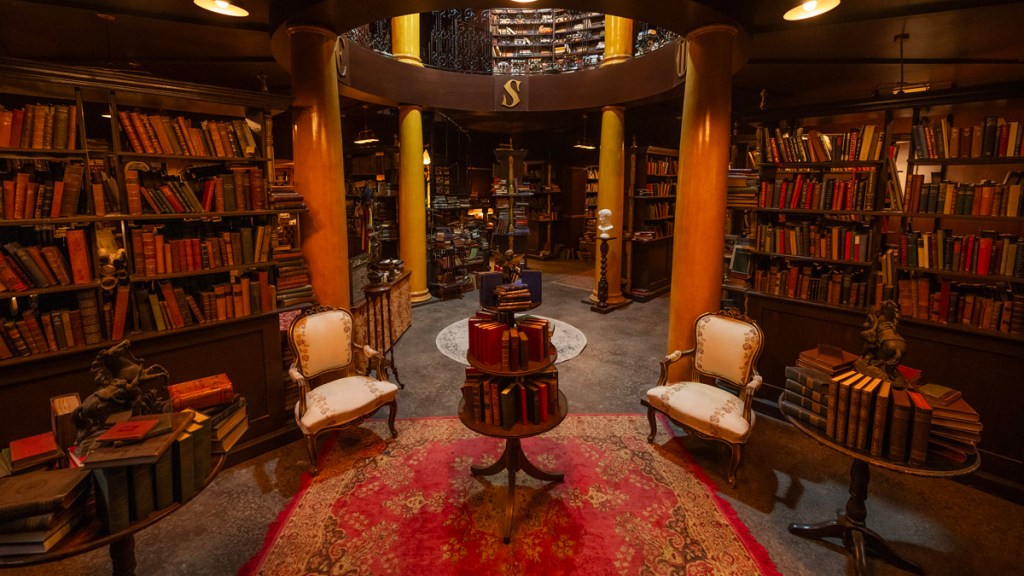
Lift up the round carpet and you’ll see a circular design on the floor, which Aziraphale and Crowley can use to perform a miracle or which can also become a portal. The symbols are taken from various different ancient religions, rather than drawing on one religious tradition in particular. Look up, and you’ll see a skylight designed in the style of a 17th-century “oculus”. “As soon as I did the oculus,” Ralph says, “I decided the steelwork would be in a compass. And so it’s like a 17th century compass up there. And when that’s the compass, and this is the magnetic centre of the compass, you must be able to jump portals or go [to] different dimensions”.
To your left is Aziraphale’s study, with Good Omens co-author Terry Pratchett’s famous hat and scarf still hanging on the coat rack. Aziraphale’s desk looks like the desk of any book-lover and academic, covered in manuscripts, letters, and bits and pieces. Sitting above the desk are some of his collection of Bibles and prophecies. Behind it are shelves filled with scrolls, suggesting Aziraphale has collected some very old books indeed. And on the shelves to the left of the desk are a present from Adam’s friend Wensleydale from season one of the TV show – a set of ringbinders containing his collection of The Wonders of Science and Nature magazines.
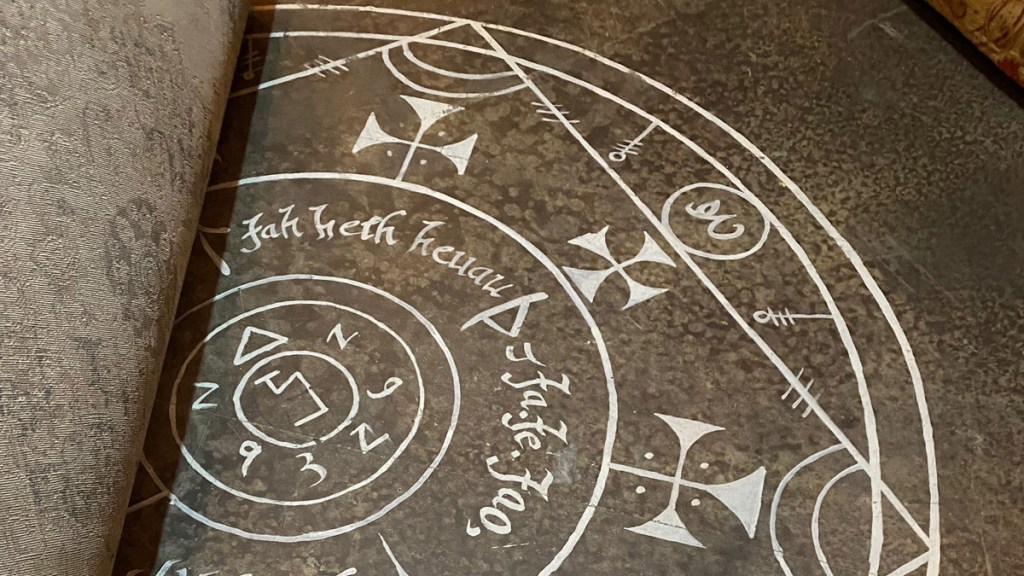
The bookshop is covered in small figurines and statues of angels, as well as characters from Greek myth and history. A head of Alexander the Great watches over the study, while Aziraphale’s desk is topped with a figurine of what looks like the tragic death of Hippolytus in a chariot. His chess set is designed with pieces dressed as Greco-Roman gods, soldiers, or columns as the rooks.
There is a small washbasin tucked away in a dark corner to the right of the study, and a very old-fashioned water system. “That’s where he makes his cocoa”, Ralph explains. Behind that is Aziraphale’s computer, which appears to date from the 1980s. “He’s got an old computer that he never, ever, upgraded from, and doesn’t use anyway”, Ralph tells us. You can follow the corridor to a sitting room at the back before wending your way back through the bookshelves and ancient sofas towards the front. The whole space is completely three-dimensional. “When the crew first came here”, Ralph says, they, “all they wanted to do was live upstairs and drink red wine and read books all day”. We’re right there with them.
Maggie and Nina’s Shops: Records, Powell & Pressburger, and Terry & Neil Graffiti
Next to the bookshop is Maggie’s record shop, which is called The Small Back Room. Maggie may not hang on to receipts from the 1960s or a 1980s computer like Aziraphale does, but there is still a charmingly old-fashioned feel to the place. The walls are plastered with album covers, all of which had to be created and written by the set decoration team.
“We couldn’t use the real ones”, Set Decorator Bronwyn Franklin explains, “[because of] the clearance issues”. It would be impractical for the producers to try to secure worldwide rights to every album cover on the walls, so Franklin and her team wrote their own. “Both Neil and Michael went in and spent an hour there reading record covers because they were so funny.”
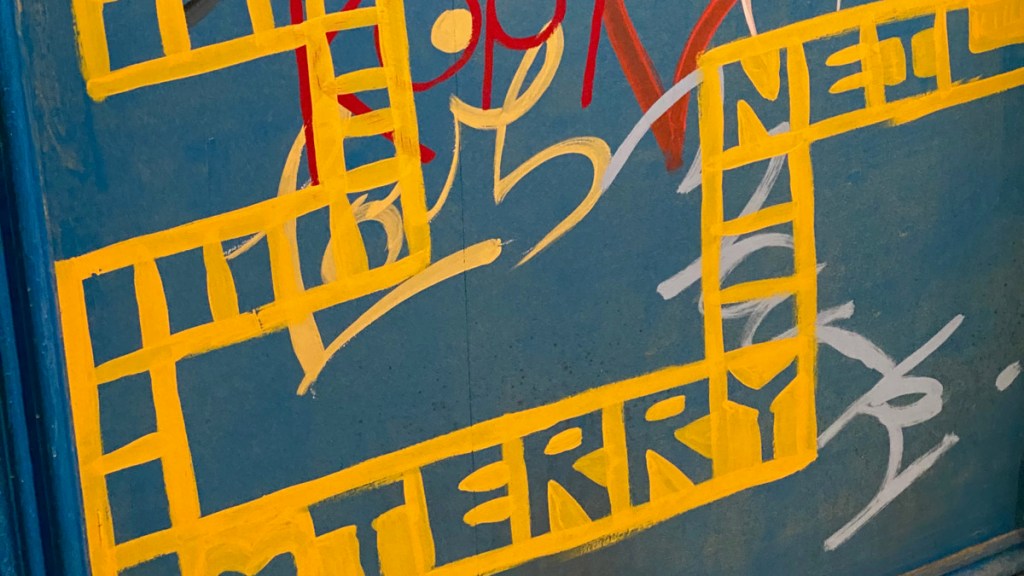
The shelves are filled with records and comic books. And the posters which appear behind Aziraphale in the show are all real, and every single one of them is a poster for a film by Michael Powell and Emeric Pressburger. We’ve looked at the importance of Powell and Pressburger to season two; there’s at least one reference to them and their films in every episode.
On the other side of the street is the coffee shop run by Maggie’s crush Nina, Give Me Coffee Or Give Me Death. This has a much more modern design, all bright colours and graffiti, done in a single day by the Art Department, but it is still a warm and cosy space (and the brownies are really excellent). The bright colours and tasty treats are all a pretty good sign that the character of Nina has a softer heart that she tends to project. A yellow snake design in the corner has the names ‘Terry’ and ‘Neil’ on display in tribute to the book’s authors, and we wonder if Crowley was responsible for the loud declaration “NOT MY M8” that appears near the floor.
David Tennant and Michael Sheen: “They’re the loveliest couple”
You can feel the love for the series and the characters everywhere on the set, all helped along by the chemistry between the two lead actors, David Tennant and Michael Sheen. “They have extraordinary on-camera chemistry, but as equally off-camera chemistry”, Producer Sarah Kate Fenlon tells us. “And they would have would have their chairs on the sets when they were setting up lights or resetting and dressing, and they would be going to have a chat. They would just be talking about their kids and about their next project. They obviously had done Staged between season one and season two, so they’d had a lot of time to bromance during Covid”.

The bromance is so strong that Producer Rob Wilkins describes Tennant and Sheen as “the loveliest couple! David was on stage [before the SAG-AFTRA strike], he was chatting to an audience and he pointed out that his wife wasn’t there with him. And I thought he was referring to Georgia, but he was actually referring to Michael!”
The Dirty Donkey: Agnes Nutter, Terry Pratchett & Circus Dolls
Turn back towards the bookshop and you can go to the The Dirty Donkey, a space which feels exactly like the interior of an old London pub. The only thing missing is the smell of beer. The style is your typical Victorian London drinking establishment, and hanging on the walls are your typical selection of oil paintings, including Constable-esque landscapes – but look closely and you will notice a couple of these have somewhat un-typical, more witchy subject matter. Hanging over the fireplace is a painting of poor Agnes Nutter being burned at the stake, while on the wall near the door is a portrait of Terry Pratchett – hat and all – as the Witchfinder General.
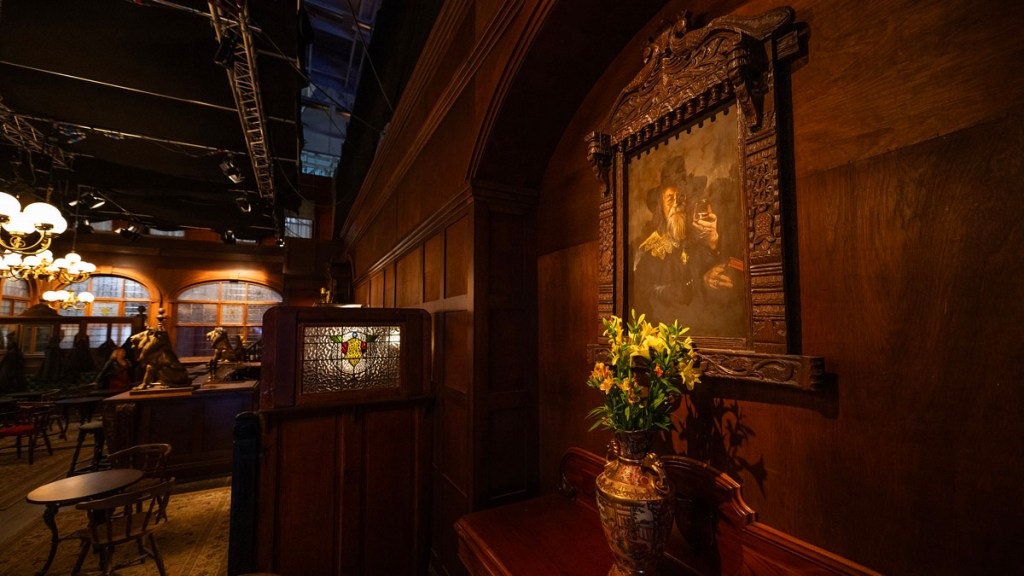
Go next door, and you’ll find yourself travelling back in time, as you go through a portal to 1941 and enter the magic shop featured in episode four’s minisode, “Nazi Zombie Flesheaters’. Once again, the smell of genuinely vintage artefacts hits you as you walk in, and you can completely leave the 21st century behind and immerse yourself in a Second World War shop filled with Victorian artefacts. That’s because many of them are real. The counter top, Bronwyn Franklin tells us, was found at a reclamation yard in Glasgow; “We didn’t build it. It’s real”.
Every item in the magic shop is filled with detail, and perhaps most impressive of all is the collection of ventriloquists’ dolls you can see displayed on shelves to the right of the door. Each and every doll has its own label, giving its name and history, like the world’s creepiest American Girl doll store. Spookiest of all, “Dolly”, is actually a genuine vintage puppet Franklin found at Kimpton Market in London. “He’d come off a ghost train”, Franklin tells us. “He had been part of the Circus Act years and years ago. I think he’s about 70 years old. He went from being in a circus, to having his fingers cut off in the ghost train so he was scary, to being picked up and put on a Neil Gaiman show”.
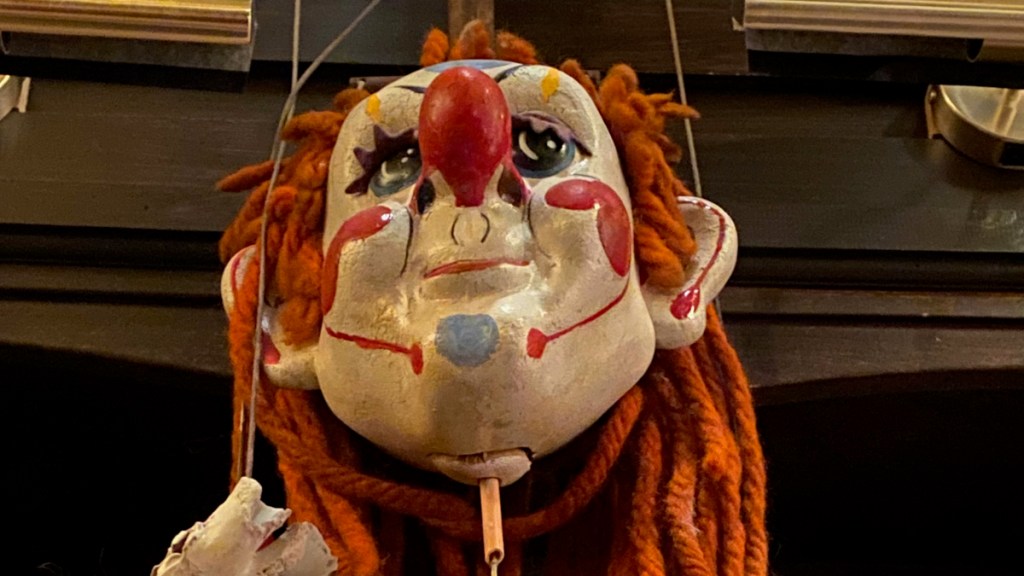
This level of detail is everywhere to be seen in the magic shop, which has little Easter eggs everywhere you look, from the orang-utan sitting at the back, to Anathema Device’s crystal ball on a table in the middle of the shop. We can also see a bright red fez proudly on display, which Crowley plays with when he comes into the shop. “David [Tennant] is a clothes horse, he loves fashion, he likes to play”, as Costume Designer Kate Carin tells us, and so we are especially excited to see the fez the good Doctor played with – because fezzes are cool – still proudly on display.
The Fairy Tale of Whickber Street
The rest of the street is filled out with shop fronts that complete the feel of a real, bustling corner of London. You can pick out some fresh vegetables at the greengrocer’s, check out the adverts in the window of the newsagents, and admire the restored furniture at Otwells Upholstery and Repair, or the exquisite tailoring at Battye and Palm. Make sure to have a look at the guitars on sale in the window of Arnold’s music shop, and check out the menu at Café Marguerite’s.
Michael Ralph explains that he wants his sets to create an experience of “pareidolia” for the viewer. Pareidolia is the name for seeing meaningful images in random patterns, like seeing faces or animals in cloud formations, or the Man in the Moon. “My feeling is that design is about creating that pareidolia for you to see”, says Ralph. As you walk down Whickber Street, the images conjured up your mind all take you to a place that feels old, lived-in, full of life and even just a little bit magical.
Good Omens season two is available to stream now on Prime Video
